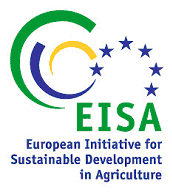 EISA, the European Association for the Promotion of Sustainable Agriculture, and their national members very much appreciate the opportunity to contribute to the development of the future Common Agricultural Policy. EISA are looking forward to a debate which in the end will allow to achieve a stable and predictable legal framework
EISA, the European Association for the Promotion of Sustainable Agriculture, and their national members very much appreciate the opportunity to contribute to the development of the future Common Agricultural Policy. EISA are looking forward to a debate which in the end will allow to achieve a stable and predictable legal framework
- for sustainable, efficient, innovative and competitive European agriculture,
- ensuring adequate incomes for European farmers,
- supporting farmers in their continuous delivery of a multitude of public benefits.
A clear focus must be put on securing high quality food supplies for roughly half a billion EU-citizens and also increasing the supply of environmentally friendly renewable energy and raw materials. In order to strengthen rural areas in Europe by generating jobs, income and positive economic development, agriculture must be sustainable and productive – and use and at the same time conserve our natural resources for coming generations.
EISA and their members highlight the importance of Integrated Farming (IF) as a holistic all-farm approach and guideline for further development of European agriculture. Beyond the continuously growing world population and the globally increasing demand for food, feed and renewable energy, there still are some areas of global concern: climate change with higher temperatures, lower water availability and the invasion of new pests, and environmental issues such as the conservation of biodiversity, the protection of ground and surface water and the conservation of soils. Integrated Farming addresses these issues as well as societal demands as decisive elements of sustainability.
With regard to the future development of the Common Agricultural Policy, the EISA European Integrated Farming Framework describes guidelines, practices and suggestions for agricultural production, covering a wide range of aspects such as “Organisation, Management and Planning”, “Human and Social Capital”, “Energy Use and Efficiency”, “Water Use and Protection”, “Climate Change and Air Quality”, “Soil Management”, “Crop Nutrition”, “Crop Protection”, “Animal Husbandry and Animal Health”, “Landscape, Wildlife and Biodiversity” and “Resource Management, Product Storage and Waste Disposal”. This allows for practical implementation of an all-farm approach rather than merely considering individual farming practices.
The EISA IF Framework is designed as a tool to be used on two different levels:
- For the individual farmer (farm owner, farm manager), the EISA Framework offers a comprehensive management tool which helps to further raise awareness, to continually improve everyday practice on farm and to achieve progress in all dimensions of sustainable development.
- For politics and administration all over Europe, the EISA Framework presents the basis for common understanding which can help to effectively shape legislative incentives and measures.
For the Integrated Farming concept, a clear and unbureaucratic legal CAP framework is needed. However, this CAP framework must leave the flexibility for farmers all over Europe to act according to their given site and situation. Hence, education, training, and capable advisory services must be understood as prerequisites for practical implementation. Only with these prerequisites, European farmers are capable to be productive, resource efficient and environmentally friendly at the same time. Last but not least, research in further innovations must be seen as decisive tool for sustainable development and hence as one element of future CAP, too.
EISA – the association
The European Initiative for Sustainable Development in Agriculture (EISA) was founded with the common aim of developing and promoting Integrated Farming throughout Europe. EISA members also help create a better public understanding of agriculture through a network of demonstration farms. EISA brings farmers and consumers together to raise awareness of how farmers are working in harmony with nature to produce high quality, safe food and renewable resources with environmental and social care.
As an organisation EISA works closely with EU Institutions and other stakeholders to contribute to the development of EU agricultural and environmental policies. With regard to future CAP, EISA and their members are willing to contribute actively to the further process of developing the CAP as a “corridor” for sustainable development in European agriculture.

 Download this page in PDF format
Download this page in PDF format